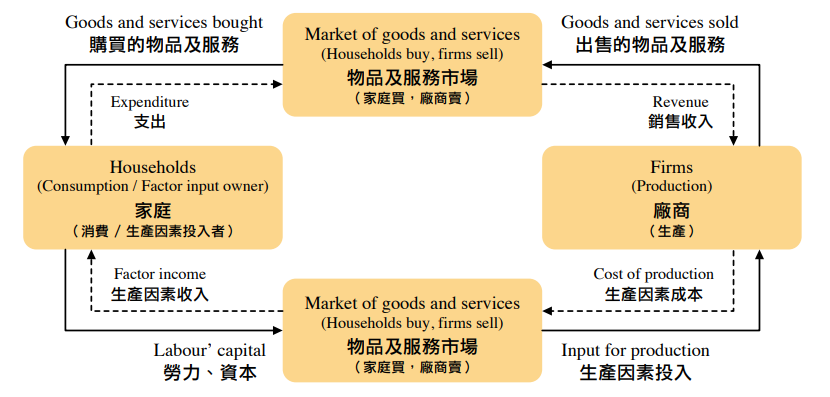Basic economic concepts dse
經濟是人類活動的核心,從古代的貿易到現代的國際金融市場,經濟活動一直影響著人類的生活和社會發展。在這樣一個複雜而龐大的系統中,了解基本的經濟概念是至關重要的。
無論您是一位企業家、政策制定者、學生還是一般大眾,經濟學都是一個值得學習和了解的主題。在這篇文章中,我們將探討一些基本的經濟概念,例如供求關係、機會成本、效率和市場結構等,以幫助讀者更好地理解經濟運作的基本原理。透過這些概念,讀者將能夠更好地理解經濟學如何影響我們的生活,並能夠更好地應對經濟變化和挑戰。
Economics 經濟學
Economics is defined as a science to explain or predict human behaviour. It
examines how individuals, firms and societies satisfy their unlimited wants
with limited resources.
經濟學是一門解釋或推測人類行為的科學,它研究個體、廠商和社會如何以有限的資源滿足他們無窮的欲望。
Wants and Resources 欲望及資源
Wants欲望
Wants is defined as human desires which can be tangible or intangible in nature. It is unlimited, and it is not necessarily backed up by
people’s purchasing power.
欲望泛指人類的一切欲念,可以是有形或無形的。欲望是無窮的,不一定需要有購買力支持。
Resources資源
Resources include natural resources, human resources and man-made
resources.
資源括自然資源、人力資源及人造資源。
Scarcity 稀少性
Scarcity states that resources are limited in supply relative to unlimited
human wants at a given time.
稀少性指在某一時期內,相對於人類無窮的欲望,資源顯得有限。
- The existence of scarcity implies that 稀少性的存在意味:
Choice and competition (method of allocating resources) are
unavoidable. Scarcity will not be solved even choice is made.
選擇與競爭(分配資源的方法)是無可避免的。即使作出了選擇,稀少性的問題仍不會被解決。 - People need to pay cost for the choice they want.
人們須付出代價以獲取他們想要的選擇。
Scarcity exists in all societies.
稀少性存在於任何社會中。
常犯錯誤
考生通常忽略稀少性(scarcity)是一個相對性的概念,當某物品的供應不能滿足人們的需求時,稀少性就會出現。所以,不論富人或窮人,要面對稀少性的問題,而選擇並非解決稀少性的方法。
Competition and Discrimination 競爭與分歧
In a one-man economy, there will be no competition or discrimination
even there is scarcity. Competition exists when two or more individuals
in society compete for more of the same good. With competition,
some criterion is needed to determine who wins and who loses, thus
discrimination is resulted.
在一人經濟中,即使稀少性存在,也不會有競爭和分歧。當社會中兩個或多個個體競爭同一物品時,競爭便會出現。若競爭存在,便須運用一些標準去決定誰勝誰負,分歧便存在。
Price Competition 價格競爭
Price competition refers to situations that people compete for economic goods by offering the owner other economic goods.
價格競爭即人們為了競爭某經濟物品而向它的擁有人提供其他經
濟物品的情況。
Non-price Competition 非價格競爭
Non-price competition refers to situations that people compete for economic goods through means other than offering the competing parties
or the owner other economic goods.
非價格競爭即透過非擁有人提供其他經濟物品以外的方法,以競爭某經濟物品的情況。
Opportunity Cost 機會成本
Opportunity cost is the highest-valued option forgone.
機會成本是指被放棄的各種選項中的價值最高。
重點概念
The word ‘highest’ is essential because the highest-valued option forgone is the only relevant option in decision-making. Those options less preferred to the highest-valued option forgone are irrelevant.
「最高」這詞是必需的,因為在作決策時,被放棄的選項中,價值最高者是各項選擇中唯一相關者,而那些價值低於被放棄的選項中價值最高者的選項,都是不相關的。
Cost is an ex-ante concept, it is not related to anything that occurs in the past.
成本是一個事前概念,它不牽涉任何過往發生的事。
Sunk cost or historical cost is not a cost as it is the cost incurred by a past
option which is no longer available now. However, it can act as a reference for in decision-making.
歷史成本不是成本,因為它是關於過去的選項的成本。可是,歷史成本可作決策之參考。
Whenever there is no alternative, there is no cost.
若是沒有選擇,就表示沒有成本。
Opportunity cost is involved only if time or other resources used in action
has alternative uses.
若用於某行動的時間及資源有其他的用途,機會成本才會存在。
Cost includes monetary costs and non-monetary costs.
成本包括貨幣性成本及非貨幣性成本。
Price is not always equal to cost. Goods that are obtained at zero price do
not imply that the cost of having or keeping them is zero.
價格不一定相等於成本。在零價格時獲得的物品並非意味擁有或持有這物品的成本是零。
Full cost includes implicit cost and explicit cost.
總成本括隱含成本與顯性成本。
The opportunity cost of action changes only when the highest-valued
option forgone changes.
只有當被放棄的選項中價值最高的價值轉變時,某行為的機會成本才會轉變。
The opportunity cost does not change when the value of the chosen option
changes only.
當被選擇的選項的價值轉變時,選擇該選項的機會成本不會轉變。
Interest 利息
Interest is the premium of present consumption over future consumption of
an identical future good in a given period.
利息是在既定時期內以即時消費某一物品來取代未來消費的溢價。
重點概念
To the borrower, interest is the cost paid for earlier availability of resources, or a price one pays for earlier over later consumption.
對借方而言,利息是支付提早取得資源的價格,或是用以支付提早消費的價格。
To the lender, interest is the compensation received for deferring the present
consumption.
對貸方而言,利息是延遲消費所取得的補償。
Interest is a price because it is a sacrifice or returns one makes to exchange
for something valuable.
利息是價格,因為它是一個人為某些有價值的東西進行交易時的犧牲或回報。
Interest exists even without money. For example, Mr. A loans Mr. B an
apple, and their agreement is that Mr. B has to return an apple plus an
orange a year later. That orange is the interest. Money is not implied in this
case.
即使貨幣不存在,利息依然存在。例如,甲先生借一個蘋果予乙先生,並協議一年之後要乙先生須還甲先生一個蘋果及一個橙。那麼,那個橙便是利息。上述個案並不牽涉貨幣。
The existence of interest shows that people are impatient to consume. People prefer present to future consumption. The marginal rate of time preference of people is positive.
利息的存在意味人們對消費缺乏耐性。人們喜愛即時的享受多於將來才享受。人們的邊際時間偏好為正數。
Goods 物品
Goods refer to anything that can satisfy human wants.
物品是指任何能夠滿足人類欲望的東西。
Economic Goods / Scarce Goods 經濟物品 / 稀少物品
The quantity of economic goods is insufficient to satisfy all human wants. More is preferred to less.
經濟物品的供給量不足夠滿足所有人的欲望,愈多便愈好。
The quantity demanded of economic goods is larger than its quantity supplied at zero price.
在價格是零的情況下,經濟物品的需求量大於供應量。
在生產中涉及機會成本。Production cost is positive.
Free Goods免費物品
The quantity supplied of free goods is sufficient to satisfy all our wants. So more is not preferred to less, but some is prefer to none.
免費物品的供給量能夠滿足人們的欲望,所以愈多並不是
愈好,但卻比沒有好。
The quantity supplied is larger than its quantity demanded at
zero price.
在價格是零的情況下,免費物品的供應量大於需求量。
Production cost is zero.
在生產中不涉及機會成本。
重點概念
A free-of-charge good may not be free goods, but free goods must be freeof charge.
一項免費的物品未必是免費物品,但免費物品一定是免費的。
A good has alternative uses does not imply that it is not a free good.
一項物品有其他用途不意味它不是免費物品。
Natural resources may not be free goods. However, free goods must be a natural resource.
自然資源或不是免費物品,但免費物品一定是自然資源。
Some goods may be free goods in some situations but economic goods in
other situations.
有些物品在某些情況下是免費物品,在另外一些情況下則是經濟物品。
Consumer Goods 消費品
Consumer goods are goods produced for direct consumption.
消費品指專供直接消費的物品。
Capital Goods / Producer Goods資本品
Capital goods are goods produced for further production of other
goods.
資本品指用來協助生產其他物品的物品。
Private Goods 私用品
Private goods are goods for which one’s consumption depletes
the consumption of other persons. Apple is an example of private goods.
私用品是一種當個人享用時會影其他人享用此物品的物品。蘋果是私用品的例子。
Private goods cannot be concurrently consumed.
私用品不能被同時消費。
Private goods are rival in use.
使用私用品時,競爭性存在。
Public Goods 共用物品
Public goods are goods that can be consumed by many individuals at the same time. An example of public goods is the music of Mozart.
共用物品是一項可供多於一人同時消費的物品。莫札特的音樂便是一個共用物品的例子。
Public goods are non-rivalry, which means that one person’s
consumption of the public good does not decrease the amount
available for another person.
共用物品是非競爭性的,即一個人享用共用物品時並不會減少其他人可享用該共用物品的數量 。
Public goods are non-excludability, which means that no one can be excluded from consuming the good.
共用物品是非排他性的,即是沒有人能被排拒享用共用
物品。
The marginal cost of serving an extra consumer is zero.
服務額外多一位消費的邊際成本是零。
Public goods can be produced privately. An example of public
goods produced privately is a television program such as
a television program produced by paid TV.
共用品可由私人生產,收費電視製作的電視節目,就是私人生產的共用品例子。
常犯錯誤
考生常將共用物品(public goods)與免費物品(free goods)混淆,又誤會政府免費提供的物品就是共用物品。
The Three Basic Economic Problems 三個基本經濟問題
What to Produce 生產甚麼
It is about making decision on the types and quantities of goods and
services to produce.
這是有關所生產的物品和服務的種類和數量的決定。
How to Produce 怎樣生產
It is about making decision on the methods of production.
這是有關生產方法的決定。
For Whom to Produce 為誰生產
It is about making decision on the allocation of output produced.
這是有關分配產品的決定。
Economic System 經濟制度
The Solutions to the Three Basic Economic Questions
解決三個基本經濟問題的辦法
The three basic economic questions can be solved by
三個基本問題可通過以下途徑解決:
a. Society’s customs and traditions 社會風俗及傳統
b. Government decisions 政府決策
c. Market / price mechanism 市場 / 價格機制
Property Right 產權制度
Private Property Right 私有產權
Private property right consists of the following three sets of rights
私有產權制度括以下三種權利:
a. the exclusive right to use 獨有的使用權
b. the exclusive right to derive income 享受收入的獨有權
c. the right to transfer 轉讓的獨有權
Price 價格
Price refers to a signal for allocating resources. It also serves as a
criterion for determining who wins or loses in competing for goods and services in the marketplace. Without well-protected private property right, the market price cannot serve as a signal device to direct resource allocation effectively.
價格是引領資源分配的信號,也是市場中競爭資源時決定誰勝誰負的標準。但若沒有保護良好的私有產權制度,市價將不能成為資源分配的有效指引。
Three Types of Economic Activities 三種經濟活動
The three types of economic activities are 三種經濟活動是:
A. Production 生產
B. Consumption 消費
C. Exchange 交易
重點概念
Exchange takes place when people do not produce all the goods and services they need by themselves. People specialize in producing certain type of output and trade with one another. Specialization always resulted in higher productivity and better living standard of people.
當人們並不自行生產所有他們需要的物品和服務,交易便出現。人們專注生產特定的物品,然後跟他人交換。專門化往往能提升生產力,為人們帶來更好的生活水平。
The following circular flow model shows the relationship between Production, Consumption and Exchange.
下面的環流程模型顯示了生產、消費和交易的關係。
實線:Flow of goods and services (factor market) 物品及服務流向(生產要素市場)
虛線:Flow of money 金錢流向
The Postulate of Constrained Maximization
在局限條件下追求極大化的假設
The postulate of constrained maximization (or postulate of selfishness)
states that an individual will always try to maximize his own ‘selfinterest’. Economics is a science resting on such postulate to explain or predict human behaviour, human choice among options.
追求極大化的假設(或自利假設)指出個人會爭取最大「私利」。經濟學就是在這個假設下解釋或推測人類行為的一門科學。
重點概念
The basic constraint of an individual is scarcity. Under scarcity, an individual must make a choice among options. Choice is assumed to be predictable, so that an individual’s behaviour can be explained and predicted.
個人要面對的最基本的局限條件是稀少性。在稀少性存在下,個人必須在眾多選項中作出選擇。選擇被假定為可被推測的,因此,個人行為能被解釋及推測。
Other constraints include cost, property rights, transaction cost, information, etc. When constraints are being specified under maximization, human behaviour can be predicted.
其他局限條件括成本、產權制度、交易費用、資訊等。在極大化下若局限條件被認清,人的行為就能被推測。
Transaction Costs 交易費用
Transaction cost is a cost that arises from a non-Robinson Crusoe (not one-man) world. It includes all costs in the operation of all institutional
arrangements in the coordination or regulation of human activities. All
transaction costs are just institutional costs.
交易費用是在非魯賓遜(非一人)世界出現的成本。它括所有機構協調制度運作的成本或管制人類活動的成本,所有交易費用也是制度費用。
重點概念
When there is only one person, property rights will not occur. Cost incurred in delineating and enforcing property rights are absent. Also, there will be
no exchange, and so costs in finding trading contracts, enforcing contracts,
marketing, price bargaining, advertising, etc are absent.
當只有一人存在時,產權制度不會存在,執行產權制度的成本也不會存在。此外,交易不會存在,尋找貿易合約、執行合約、市場推廣、議價、廣告等成本也不會存在。
Transaction cost is a constraint. Thus, changes in the amount of transaction costs related to a particular activity will lead to changes in human behaviour. When transaction costs related to a particular activity are reduced(increased), more (less) of that particular activity will take place.
交易費用是一種局限條件。因此,關乎個別活動的交易費用數額的轉變,會引致人類行為的轉變。當關乎個別活動的交易費用減低(增加)時,該項個別活動便會更多(更少)進行。
Positive Economics VS Normative Economics
實證經濟學 VS 規範經濟學
Positive Economics 實證經濟學
Positive economics focuses on facts and avoids value judgments. It concerns ‘what is’.
實證經濟學注重事實而避免價值判斷,關注「是甚麼」。
Normative Economics 規範經濟學
Normative economics involves value judgments. It concerns ‘what ought to be’, and thus has no explanatory power. It is not a science.
規範經濟學涉及價值判斷,關注「應該做甚麼」,沒有解釋能力,不屬科學。
如果大家有什麼補習問題,如私人補習、網上補習好唔好,歡迎你可以隨時再跟我多交流一下,可以Follow 「學博教育中心 Learn Smart Education」 Facebook page同IG得到更多補習課程資訊,亦都可以上我們的補習網頁了解更多!
DSE Econ 文章系列
Microeconomics
Macroeconomics
- 經濟表現的量度 Measure of economic performance
- 國民收入決定及價格水平 National income determination and price level
- 貨幣與銀行 Money and Banking
- 宏觀經濟問題和政策 Macroeconomic Problems and policies
- 國際貿易和金融 International Trade and Finance





